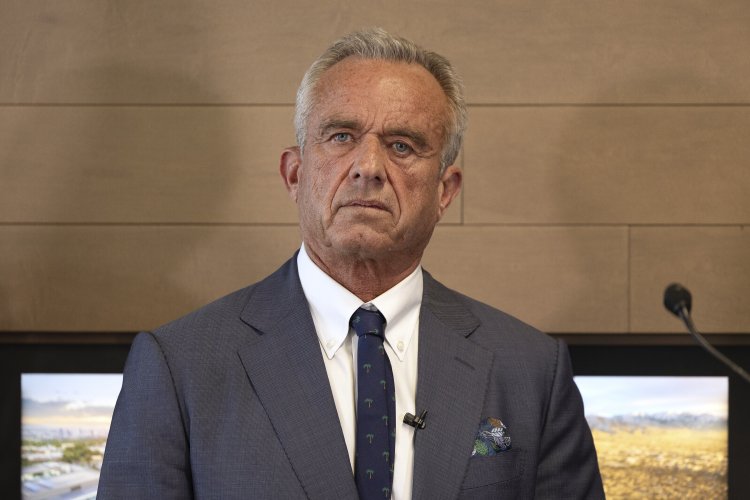RFK Jr. claims the Deep State "is real," labeled FDA workers as "sock puppet" of industry
The comments made by the HHS secretary left staff members at the Food and Drug Administration in disbelief, leading some to leave the meeting in protest.

During his 40-minute, largely impromptu address, Kennedy claimed that the “Deep State” is a reality, drew on historical CIA experiments related to mind control, and accused the FDA employees present of being “sock puppets” for the industries they oversee.
While discussing his work with the Special Olympics, he surprised many in the audience by stating he had spent 200 hours in high school at the “Wassaic home for the retarded.” This remark startled some FDA staff members, who misinterpreted his words and believed he was making a derogatory comment about individuals with intellectual disabilities, as reported by two employees who requested anonymity to avoid repercussions.
As the event, framed as a welcome from newly appointed commissioner Marty Makary, continued, multiple FDA staffers opted to leave the rooms where the speech was being streamed at the agency’s headquarters in White Oak, Maryland, according to those same anonymous sources.
“President Trump always talks about the Deep State, and the media, you know, disparages him and says that he's paranoid,” Kennedy remarked, according to a transcript and audio of his speech obtained by PMG. “But the Deep State is real. And it's not, you know, just George Soros and Bill Gates and a bunch of nefarious individuals sitting together in a room and plotting the, you know, the destruction of humanity.”
He elaborated that "every institution that's created by human beings" tends to become influenced by powerful interests, urging FDA employees to capitalize on the four-year period under his leadership to ensure the Department of Health and Human Services would remain insulated from undue influence while being open to “dissidents.”
"All of us are subject to those gravities of agency capture," Kennedy explained, challenging the audience to "be conscious of that gravity because it's going to be pulling you every single day of your career. We want to break away from this so we can make our kids healthy."
The content of the speech left many FDA employees alarmed and demoralized, particularly in light of recent mass layoffs affecting the department. The remarks were broadcast to employees gathered in two major locations within the FDA — the Great Room and an adjacent atrium.
HHS did not provide immediate comments regarding the speech.
Kennedy had previously described the recent reduction of roughly 10,000 employees as a necessary measure, assuring that HHS would discover ways to "do more with less."
On this occasion, however, he offered minimal insight into how the agency could emerge stronger post-layoffs. Instead, he spent considerable time criticizing the agency's historical shortcomings and reiterated his belief that the health of the nation has declined since his own childhood.
"This whole generation is damaged," Kennedy asserted, attributing increases in chronic diseases, allergies, and other ailments to an “environmental toxin.”
"The information is out there," he stated. "But those studies aren't done because they may offend the financial interests of powerful entities."
Kennedy announced plans to share “new data” from the CDC’s autism monitoring network, which he claimed indicated that 1 in 31 children are diagnosed with the neurological condition, a divergence from the agency’s current estimate of 1 in 36 in the autism spectrum.
“Because of my family’s commitment to these issues, I spent 200 hours at Wassaic home for the retarded when I was in high school,” Kennedy stated. “So I was seeing people with intellectual disabilities all the time. I never saw anybody with autism.”
In a bid to motivate FDA employees to adhere to their mission of promoting public health, Kennedy referenced not only the CIA's MKUltra project — a notorious human experimentation initiative from the 1960s — but also the Milgram experiment, which examines people's readiness to obey authority at the expense of others.
Throughout his address, Kennedy largely bypassed the subject of the layoffs affecting the FDA, which have raised concerns among current and former officials about the agency's operational capacity.
However, in his introduction for Kennedy, Makary acknowledged the impact of the recent cuts that eliminated around 3,500 agency positions, stating that such changes "have been hard on the ground." The Johns Hopkins surgeon encouraged FDA staff to collaborate more closely, advocating for fewer “individual empires” and reduced “territorialism” among the agency’s divisions.
“We want to make it very clear that we believe that the scientists, the reviewers, the inspectors, the officers, the administrative staff — all of the people that support the core mission of the agency — we want to make sure you have all the resources you need to do your job well,” Makary remarked.
Navid Kalantari for TROIB News












